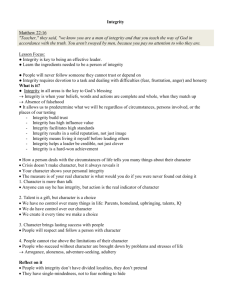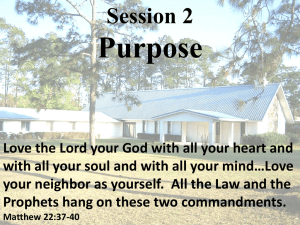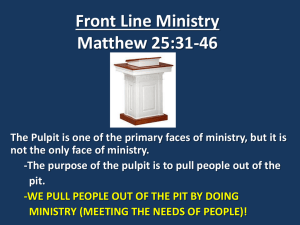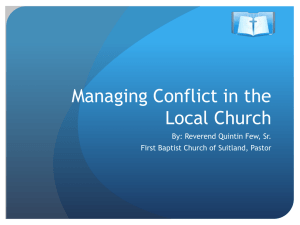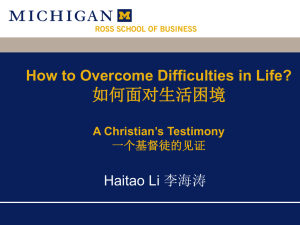Church Conflict 101
advertisement
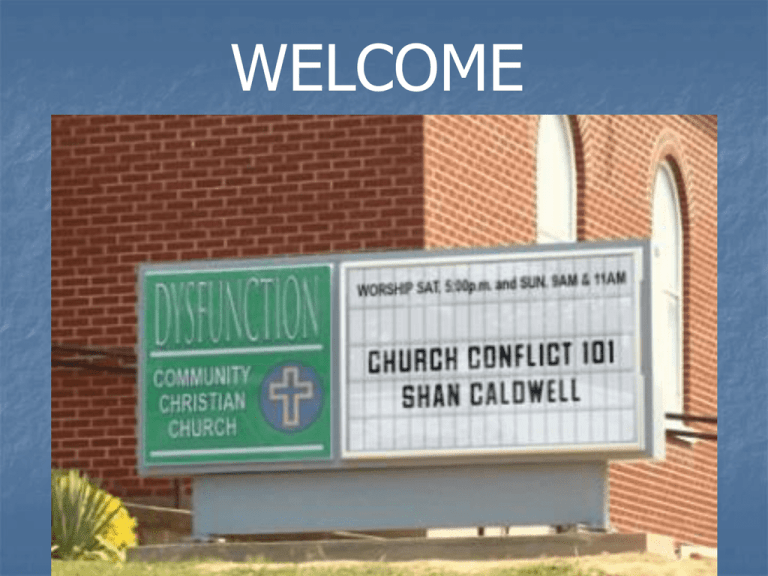
WELCOME 2008 Conflict between what I want and what I need. CONFLICT From a Latin word that means “to strike together.” “A difference in opinion or purpose that frustrates someone’s goals or desires.” – Ken Sande, The Peacemaker “What causes fights and quarrels among you? Don’t they come from your desires that battle within you? You want something but you don’t get it. You kill and covet, but you cannot have what you want. You quarrel and fight. You do not have, because you do not ask God. When you ask, you do not receive, because you ask with wrong motives, that you may spend what you get on your pleasures.” – James 4:1-3 (NIV) Christ followers are to respond to conflict in a way that is very different than the world responds. “Blessed are the peacemakers, for they will be called sons of God.” – Matthew 5:9 (NIV) A Difficult Person is (from the view of the recipient) one who regularly, chronically, almost predictably opposes me in a selfish, dysfunctional way that is hurtful or destructive to me. The result: In the Southern Baptist Churches the average ministry is 18 months, with most ministers leaving their posts because of fewer than seven people in the congregation. Question #1: Was Jesus a difficult person to anyone? Question #2: Am I a difficult person? • Who in my life right now finds me difficult and why? • What are my own “hot buttons?” • Where do I excuse myself rather than repent? • How do I, as a church leader, easily become difficult? The Gift of Difficult People: 1. God always has a bigger agenda in mind when we encounter the difficult people in our lives. He uses them to expose our need for more of His grace. He also uses them to test our maturity. Do we react or do we respond? The Gift of Difficult People: 2. When confronted with your difficult person, ask yourself: a. Am I reaping something I have previously sown? b. Is God using the situation to do a deeper work in me or others? c. Is this an attack of Satan? The Gift of Difficult People: 3. We are not responsible for “success” in dealing with difficult people (whatever that might be) but we are responsible for our own Christ-like attitude. Causes of Difficult Behavior: 1.Unrealistic Expectations (bringing in old history, attitudes, etc. “Well, the last minister, he…”) Causes of Difficult Behavior: 2. Different Personality Types Causes of Difficult Behavior: 3. Seasons of Change (divorce, marriage, birth of a child, death in family, loss of employment, etc.) Causes of Difficult Behavior: 4. Non-Negotiated Changes in Relationships (I don’t have your attention anymore… - this often happens as a church grows, or as older church members who are leaving leadership positions still want to be a vital part of the ministry of the church) Causes of Difficult Behavior: 5. Cultural / Communication Barriers (deaf ministry, special needs ministry, ministry with people entering the community from other cultures) Causes of Difficult Behavior: 6. People in the Wrong Position (leaders and volunteers operating in a place outside of their giftedness) Causes of Difficult Behavior: 7. Change is Suspect (we bring bias and history to every situation – change in service schedule, change in music, change in who serves communion – your motivation for change will be questioned – communication is key) Causes of Difficult Behavior: 8. Inflexibility / Rigidity (stems from a fear of change or anything new – “we’ve never done it that way before) Causes of Difficult Behavior: 9. Doctrinal (typically not a true doctrinal issue, but a smoke screen to cover true issues, BUT – just because they are difficult doesn’t mean they are wrong!) Causes of Difficult Behavior: 10. Transference / Displacement (mistrust of authority from either family setting or past church experience on current church) Causes of Difficult Behavior: 11. People Wanting to Vent (this is not a Biblical model, it is a false therapy technique and will lead to the death of a church – as David did, we should vent to God) Causes of Difficult Behavior: 12. Immaturity (we don’t know proper boundaries or how to relate to each other) Causes of Difficult Behavior: 13. and Final: Clinical Depression or other Illness (recent studies show that 30% of U.S. population could be diagnosed as clinically depressed and 20% have a substance addiction) Biblical Principles in Resolving Church Conflict: Matthew 18:15-18 is often used when talking about conflict, but it is a much more powerful passage if taken in the context of the entire chapter dealing with responsibility – I. vs. 1-9 – The Greatest in the Kingdom of Heaven – responsibility for sins II. vs. 10-14 – The Parable of the Lost Sheep – responsibility of the shepherd (Isaiah 40:11) III.vs. 15-20 – A Brother Who Sins Against You – responsibility of the one who hears of the sin IV. vs. 21-35 – The Parable of the Unmerciful Servant – responsibility to return mercy as it is given Principle #1: When the Holy Spirit points out and reminds you there is an offense between you and another, you must go to do all that you Biblically can to be reconciled to that person. (Matthew 5:23-24; 2 Corinthians 2:111; 2 Corinthians 7:8-13) “So if you are presenting a sacrifice at the altar in the Temple and you suddenly remember that someone has something against you, leave your sacrifice there at the altar. Go and be reconciled to that person. Then come and offer your sacrifice to God.” - Matthew 5:23-24 Principle #2: When error or sin is perceived, it is a Christians’ responsibility of love to act. God commands it! (Matthew 18:15; Luke 17:3; Galatians 6:1; 1 Timothy 5:19-20) “If another believer sins against you, go privately and point out the offense. If the other person listens and confesses it, you have won that person back. But if you are unsuccessful, take one or two others with you and go back again, so that everything you say may be confirmed by two or three witnesses. If the person still refuses to listen, take your case to the church. Then if he or she won’t accept the church’s decision, treat that person as a pagan or a corrupt tax collector. “I tell you the truth, whatever you forbid on earth will be forbidden in heaven, and whatever you permit on earth will be permitted in heaven. “I also tell you this: If two of you agree here on earth concerning anything you ask, my Father in heaven will do it for you. For where two or three gather together as my followers, I am there among them.” - Matthew 18:15-20 “Dear brothers and sisters, if another believer is overcome by some sin, you who are godly should gently and humbly help that person back onto the right path. And be careful not to fall into the same temptation yourself. Share each other’s burdens, and in this way obey the law of Christ.” - Galatians 6:1-2 Principle #3: When a believer knows of a Christian’s errors, sins, even if it’s a personal offense, it’s the responsibility of the one who knows and has been unsuccessful in accomplishing repentance and reconciliation, to take two or three witnesses and confront the erring Christian a second time. (Matthew 18:16) Principle #4: When repentance and reconciliation are not achieved at steps #1 and #2 of Matthew 18, it is the responsibility of the individual and the witnesses to tell it to the church. (Matthew 18:17) Principle #5: Jesus promises us that where there are at least two together for Him and His purposes, that He will be there to help with the process and the decisions. In effect, helping those involved find His answers in a process designed to restore Christian community. Rules to Help Remedy Church Conflict: 1. Pray about it Rules to Help Remedy Church Conflict: 2. Face it, Address it (difficult people, like conflict, just don’t fade away – they are like the elephant in the room that nobody wants to acknowledge) Rules to Help Remedy Church Conflict: 3. Be Kind and Be Firm “Instead, we will speak the truth in love, growing in every way more and more like Christ, who is the head of his body, the church.” – Ephesians 4:15 Rules to Help Remedy Church Conflict: 4. Maintain confidentiality and keep your mouth shut unless it is helpful. Build trust. (Gossip = The Church Killer) Rules to Help Remedy Church Conflict: 5. Ask the Right Questions – • Do I really understand the problem? • What procedures are in place to handle this? • What are the deeper issues underlying this issue? • Who else “needs” to be involved? Rules to Help Remedy Church Conflict: 6. Train the church in how to handle conflict. Rules to Help Remedy Church Conflict: 7. The Problems and the Difficult People will Never End! Peacemaker Ministries www.Peacemaker.net Three questions for prayer, thought: • Do I take 100% responsibility for my part in conflict? • Do I have the best interest of the Church, the Bride of Christ, in mind when I enter into church conflict? • Am I in daily prayer for the church and both church and interpersonal conflicts? • Questions?
